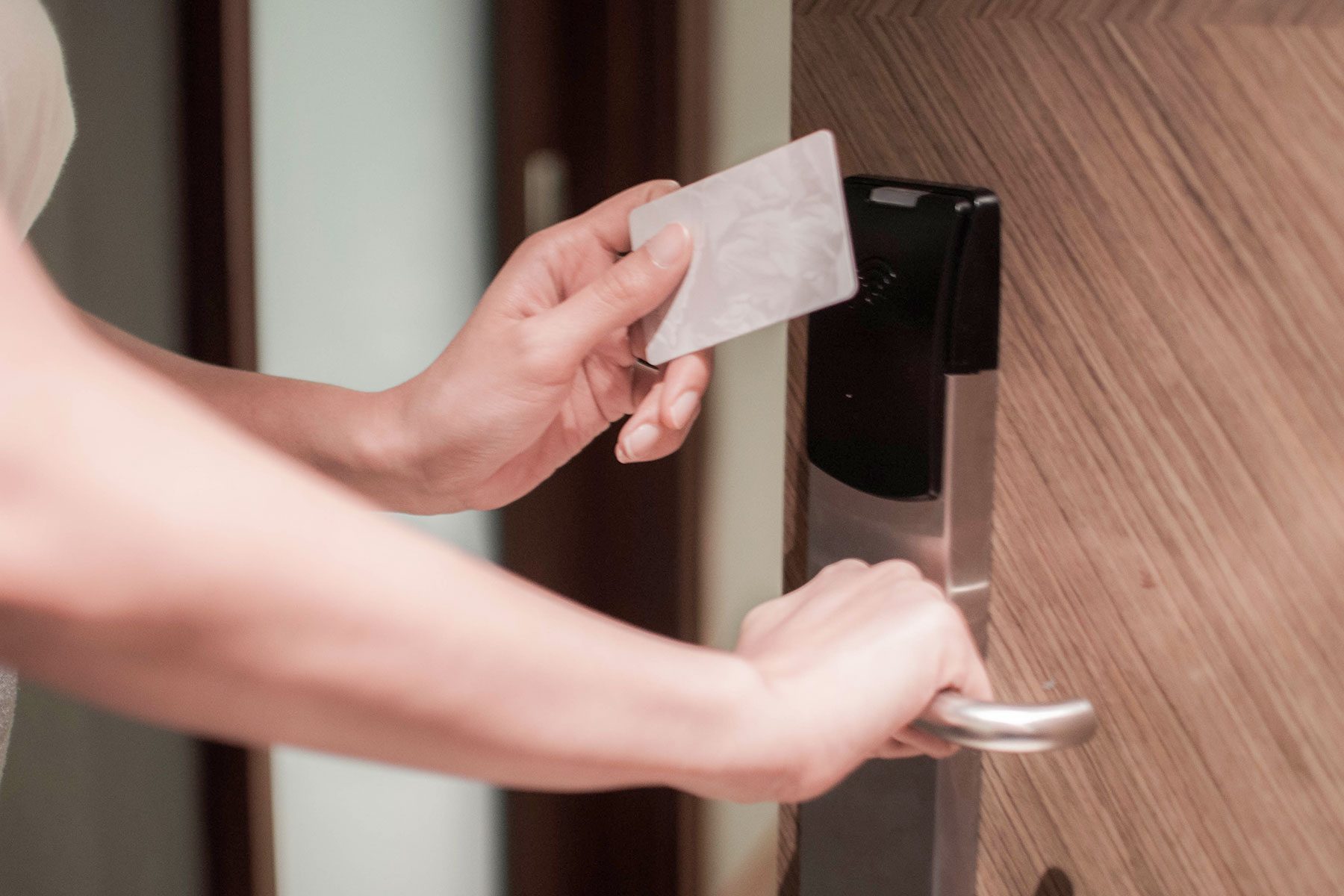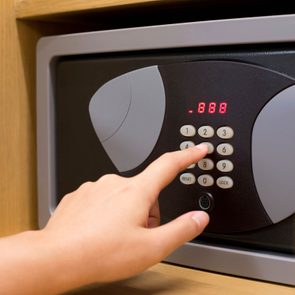Learning how to secure a hotel room door with a towel and take other precautions will make your hotel stay as safe as possible. Here's what security and travel experts recommend.

How to Secure Your Hotel Room, According to a Security Expert

Traveling is exciting—new sights, cuisines and adventures await. Unfortunately, our excitement for a well-deserved getaway can sometimes overshadow the necessity of taking safety precautions when traveling. But knowing tricks like how to secure a hotel room door with a towel or how to use tissues to protect your privacy can give you peace of mind. After all, being in an unfamiliar place can be unnerving, especially if you are traveling solo. And when something happens to make your safety feel compromised, it’s hard to imagine getting a good night’s sleep.
For travel writer Ulrike Lemmin-Woolfrey, who spends an average of 75 nights a year in hotel rooms, most of them solo, that truth hit home a few years ago, when she spent the night in a small hotel in Milan. “Instead of keys, they had a code thingy on the door,” she says. “So every traveler got an eight-digit code, supposedly randomly generated. I thought, Well, that is neat and safe.” That is, until 6 a.m., when she heard the digital keypad beep, and someone walked into her room.
“I just yelled at them to get out, and they made a hasty retreat,” she says. “When I complained to the hotel, they said it was a woman who apologized profusely, but her code seemed to have been so similar to mine that she could open my door. I no longer felt safe.” Fortunately, her scare seemed to be the result of an honest mistake. But it’s a good reminder to keep hotel room safety foremost in your mind, especially when it comes to hotel door security.
We asked Lemmin-Woolfrey and a security expert about tricks you can use to make your hotel experience safer and more comfortable. From trying a popular TikTok hack that teaches how to secure a hotel room door with a towel to paying closer attention to key elements of your environment, these are the actions to take when you check in for your next hotel stay.
Get Reader’s Digest’s Read Up newsletter for more travel, tech, humor and fun facts all week long.
How to secure a hotel door
There’s a bevy of social media videos showing how thieves can use a simple metal device, similar to an unbent coat hanger, to reach under a hotel room door, hook onto the door latch and easily open it. So we rounded up some tips for how to secure a hotel room door the next time you travel, plus even more tricks to ward off would-be intruders.
Use a towel in the door safety latch
According to a flight attendant named CiCi who posts safety tips on her @ciciinthesky TikTok account, securing your hotel door starts with an item you’ll find in every hotel room: a towel. Grab a small hand towel from your bathroom and put it around the door’s safety latch before closing the latch lock. The towel makes it more challenging for intruders to open the door from the outside using any device.
@ciciinthesky My military father raised me and my sisters to be situationally aware and vigilant where ever we are. I have raised my daughters the same way. We dont live in fear, we are cautious. #aviationtiktok #travelhack #flightcrew #flightattendantlife #hotelsafety#greenscreenvideo ♬ original sound – CiCi in the Sky
Pro tip: Keep the towel by your hotel room door so you’ll remember to use it whenever you’re in the room.
Put a rolled-up towel behind the door lever
Clicking the hotel room deadbolt shut should impart a feeling of security. But a thief could still slide a special tool under your door and open a lever-style door handle from the outside.
By taking a bath towel, rolling it up and tightly wedging it behind the lever (in the space between the handle and the door), you render that breaking-and-entering tool useless. The lever won’t budge with the towel in place.
Block the peephole
If your hotel room door has a peephole, make sure it’s blocked. Some come with a little cover that slides over the peephole—easy peasy.
But what if your peephole is uncovered? You can use tape or even bathroom tissue to block the hole so that no one can see in your room.
Hang the do-not-disturb sign

Whether you’re in the room or not, the do-not-disturb sign gives the impression that the room is occupied and is more likely to dissuade potential thieves.
“Unless my room really needs tidying up,” says Lemmin-Woolfrey, “I make extensive use of my do-not-disturb sign. I am not a fan of people touching or potentially going through my stuff.”
Pack your own doorstop
Learning how to secure a hotel room door with a towel is a travel trick that relies solely on items in your room. If you can spare a little space in your suitcase (and some forethought), pack a lightweight doorstop to further foil intruders. Always keep two in your suitcase, in case you’re assigned a room with an adjoining door.
“Bringing a tiny rubber doorstop to wedge under the door helps in those rooms that might not have a proper lock,” says Lemmin-Woolfrey. “The door is practically impossible to open if one of those is in place.”
Invest in portable safety tools
If you’re willing to spend a little money, it’s worth looking into travel tools specifically created with hotel door security in mind. They’re especially handy if you travel often.
You can invest in a door-stopper alarm, which will make a big noise should someone try to force the door open. Or get a lightweight portable door lock that packs nicely into your suitcase.
Other hotel safety tips you should know
If the first thing you do when you step into a hotel room is check for intruders, you may be focusing on the wrong things. Matthew Lack, a retired detective with the United Kingdom’s National Crime Agency (the U.K. equivalent of the FBI), says that when it comes to hotel room safety, the biggest risks occur outside the room. “The likelihood of someone hiding in your room when you check in is remote,” he says. “Because how would they know that you’re traveling alone or which room to wait in?”
Instead, he says you’re most vulnerable when you’re entering the room and while you’re inside. “It only takes a foot in the door for someone to force their way in,” Lack notes.
With that in mind, here are tips for how to stay safe in the wider hotel environment.
Be wary of people who are “too close”
If someone’s trailing you closely as you walk to your hotel room, they may be searching for their room number—or they could be waiting for their chance to strike. “In a few steps, that person can catch up to you as you stop to open your door,” says Lack. Once your door is open, they could force their way inside.
“Walk past your door instead of going in,” he says. Chances are, the person is just looking for their own room. But if you’re concerned, head back to the lobby and insist that a staff member accompany you to your room.
Refuse unexpected visitors
Lack says that intruders will use the same tactics he and his colleagues used to apprehend criminals. “How many times did I pose as a parcel delivery person in order to nab a suspect?” he recalls. “It’s a lot easier than breaking a door down.”
And it’s also a good safety lesson. Unless you are expecting room service, a delivery or some other caller, don’t open the door for them without first phoning down to the lobby to confirm that they’ve sent someone to your room.
Ask for two room keys

If you’re traveling alone, be aware of who’s nearby when you check in at your hotel. As a frequent solo traveler, Lemmin-Woolfrey relies on a special trick to fool anyone who might see her traveling by herself and try to take advantage. “When someone has stood a little too close to me at check-in, I’ve asked for two room keys so they’ll think I’m with someone,” she says.
Some good news: Any reputable hotel should write down your room number and discretely hand it to you, rather than saying the number out loud. That protects your privacy from listening ears.
Ask for a special floor
Lemmin-Woolfrey, who’s currently based in Qatar, says that especially in the Middle East, hotels may have women-only floors. When she’s traveling alone, she’ll request one.
“And I never accept rooms on the ground or first floor because I like to sleep with my windows open,” she says. If that’s an option at the hotel where you’re staying and you’re concerned about someone entering through the window, ask for a room on a higher floor.
Check for hidden cameras
“If you watch too many James Bond films, you can really drive yourself mad,” says Lack. But depending on where in the world you travel, you may be surveilled, especially if you’re traveling for business or you have any background in government or law enforcement. “If I were traveling to Russia or China, I would expect there to be cameras hidden in the hotel room,” he says.
Yikes! You obviously can’t tear the room apart, but if you’ve got a real reason to expect prying (er, spying) eyes, he says to check items like clocks, tufted pillows or stuffed animals. You’ll feel like 007, indeed!
About the experts
|
Why trust us
Reader’s Digest has published hundreds of travel stories that help readers explore the world safely, easily and affordably. We regularly cover topics such as the best places to visit (and the best times to visit them), tips and tricks to zoom through airport security, flight-attendant secrets, hotel-room hacks and more. We’re committed to producing high-quality content by writers with expertise and experience in their field in consultation with relevant, qualified experts. We rely on reputable primary sources, including government and professional organizations and academic institutions as well as our writers’ personal experiences where appropriate. We verify all facts and data, back them with credible sourcing and revisit them over time to ensure they remain accurate and up to date. For this piece on how to secure a hotel room door with a towel or other tools, Elizabeth Heath tapped her experience as a longtime travel writer and frequent traveler to ensure that all information is accurate and offers the best possible advice to readers. Read more about our team, our contributors and our editorial policies.
Sources:
- Matthew Lack, former police officer and specialist with the U.K.’s National Crime Agency and co-owner of Segreto Gelsomino; interviewed, October 2024
- Ulrike Lemmin-Woolfrey, travel writer and frequent traveler; interviewed, October 2024
- @ciciinthesky on TikTok: “Hotel Safety Tips from a Flight Attendant”
- @nbcbayarea on TikTok: “#SanJose #hotel room break-in attempt caught on camera”























